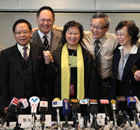Society
Carriers of blood disease denied civil servant jobs
By Zheng Caixiong and Mo Xuan (China Daily)
Updated: 2010-02-03 07:12
 |
Large Medium Small |
GUANGZHOU: Three carriers of a genetic blood disease who were denied jobs as civil servants have launched legal action against the Foshan bureau of human resources and social security.
| ||||
It is the first case of its kind to be heard on the Chinese mainland.
Zhou Jianhua, deputy director of Foshan bureau of human resources and social security, told Chancheng district people's court that the refusal was lawful because the men failed to pass a health checkup.
The trio are carriers of thalassemia, which refers to a group of inherited disorders in which the amount of hemoglobin in the blood is reduced. Some thalassemia patients are anemic. According to government health law, civil servant job applicants cannot be hired if they have anemia.
Shao Hong, a doctor from Foshan No 2 People's Hospital, said thalassemia gene carriers should belong to the same medical group as anemia patients, though they might not have the same symptoms.
"Therefore, the plaintiffs failed to pass the health checkup," Shao said.
The three plaintiffs did not appear in court yesterday.
However, Tang told China Daily that the trio are not anemia patients and that the city government discriminated against them.
"It is not fair to us and similar gene carriers," Tang said.
"We are healthy and no different from other applicants in work and daily life," Tang said.
Tang, who graduated from university last July, said she had donated blood in the past because she was considered healthy enough.
Huang Yizhi, attorney for the plaintiffs, said the health checkup went beyond the scope for recruiting civil servants.
"Denying thalassemia gene carriers the opportunity to be government employees is certainly discrimination," Huang told China Daily after the hearing.
The defendant was wrong to conclude that the plaintiffs are anemia carriers, he added.
Yu Fangqiang, director of Beijing Yirenping center, a non-profit organization dedicated to promoting health education, said the bureau had breached the principal of fair opportunity in the recruiting of government employees.
Zhou Wei, a law professor from Sichuan University, said the defendant had no right to ask the plaintiffs to undergo a genetic examination.
"The defendant has infringed upon the plaintiffs' privacy," Zhou said.
Li Chunfu, a professor from Guangzhou-based Nanfang hospital, said thalassemia gene carriers or those with light symptoms usually have little chance of developing physical symptoms.
"Therefore the defendant has no reason to deny the thalassemia gene carriers jobs," Li said.
In Guangdong and Hunan provinces and the Guangxi Zhuang autonomous region, between 12 percent and 15 percent of the population are thalassemia gene carriers.
Last year, 31 people were examined to be the thalassemia gene carriers from a total of 598 applicants who participated in the examination for recruiting civil servants in Guangdong in 2009.
The court said it would rule on the case in three months.








